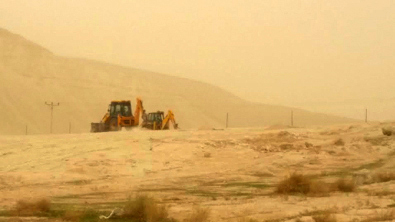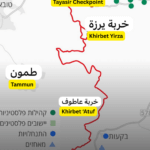Palestinian land confiscated in central Jordan Valley
300 dunums of Palestinian privately owned land in Fasayal village, located in the Jordan Valley, have recently been confiscated by Israeli authorities in cooperation with illegal Israeli settlers. The land is located between two illegal Israeli colonies, Yafit and Masu’a, and furthermore, the land borders route 90 which in many cases is off limits for Palestinians because of “security reasons”.
Israeli Authorities and illegal Israeli settlers were seen 6 months ago preparing the land with bulldozers in order to level the soil surface and building a water station to collect water for the agricultural project. On the 19th of December, the project was continued by digging holes for trees. By now, already 400-500 date trees have been illegally planted on the land, while the Palestinian owner is being denied access to his own land.
Fasayal village was declared area C under the Oslo Agreement and later declared “state land”. During the Israeli occupation more than 3,400 dunums of Fasayal privately owned land have been confiscated in the establishment of four Israeli colonies and an Israeli military base. While Palestinian land is confiscated for “security purposes” or for not being cultivated for three consecutive years – no matter the reason being “closed military zone” – illegal Israeli colonies continue expanding taking over more and more Palestinian land for residential and agricultural use.
As 94% of the Jordan Valley was declared area C according to the 1993 Oslo Agreement, Israeli Authorities keep Palestinian farmers and developers from developing agricultural projects in the valley and creating jobs. In contrast, the colonies enjoy extensive investment of resources including a generous allocation of water, allowing them to develop modern intensive agriculture and exporting a great quantity of fruits and vegetables to Israel and Europe. Approximately 40% of the Israeli export of fruits and vegetables come from the Jordan Valley, while Palestinians face severe obstacles such as Israeli checkpoints and controls in the airports and ports. In addition, Al Monitor states, that the cost of export from the Jordan Valley through the Port of Ashdod is about $1,700 per container, according to Sinokrot, while the cost to export from the settlements in the Jordan Valley through the Port of Ashdod is only $700 per container.
Palestinians in the Jordan Valley suffer from lack of access to water, as Israel over the last four decades has isolated 162 agricultural wells east of route 90 for “security purposes” and furthermore controls where wells can be built, how deep they can be and how much water is allowed to be pumped from them. In addition, Israel is digging wells at critical depths, which hit the salt beds and cause the water from Palestinian wells to be salty, and in addition situates new Jewish-only wells near Palestinian springs, drying out or using much of the Palestinian water. Furthermore, Israel controls the Jordan Valley water by preventing Palestinians to use their share of the 250 million cubic meter of the Jordan River. Meanwhile, settlers receive 75% discount on their water bills and are estimated to use 6.6 time more water than their Palestinian neighbours.
Jordan Valley Solidarity calls for an immediate end to the silence of the international society, the United Nations and the European countries towards the illegal land grapping, the stolen water, the expansion of the colonies and the illegal occupation. Furthermore, we call for the UN, the European countries and the international solidarity to send protection to the Palestinian people in area C of the Jordan Valley in order to protect the people, the land and their resources.







